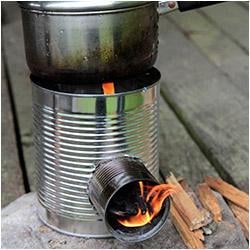|
Last week, I wrote to you about Steve Callahan's story of survival at sea. In case you missed it, you can click here to read all about it. 
What's your situational awareness? Callahan's story had two powerful lessons that we can all apply to our preparedness journey. I felt that one of those lessons deserved a bit more attention - the power of improvisation in a survival situation. Today, I wanted to share some practical tips for developing those improvisation skills. BECOME A SURVIVAL IMPROVISER
Improvisation. Most people are familiar with the kind of improv you might see in a comedy act or television show. The actors have no script, but still create something hilarious out of thin air. Well, those same improvisation skills can be applied to any emergency situation. Except, instead of being without a script, you might be without something critical to survival. In short, you'll need to learn how to improvise an alternative to that survival essential out of thin air. Improvisation skills are extremely important to have because emergencies tend to find us in less-than-ideal circumstances. Much as we try, we're never going to be 100% prepared for what comes next. So let's jump into these improvisation tips, shall we? TIP #1: TAKE STOCK OF YOUR SURROUNDINGS This tip is commonly referred to as situational awareness. In the movies, it's something heroes like Jason Bourne, Sherlock Holmes and James Bond seem naturally gifted with. For the rest of us non-fiction heroes and patriots, it's a skill that takes time to develop. First, you must learn to observe your surroundings, and then orient your situation to what you have observed. 
Observe your surroundings For example, if you are in the woods, you want to observe the trees, the wildlife and potential sources of water. Then, you orient yourself to this environment so you can focus on what's most important in the given moment. No water? Search for elevation changes, animals walking downhill, listen for running water and more. In an emergency, almost anything can be used to your advantage. So observe calmly, slowly and based on the needs of your particular situation. The next tip will give you some truly practical tips on re-purposing everyday items - all of which have come out of proper observation and orientation. TIP #2: RE-PURPOSE & TRANSFORM EVERYTHING In this world of modern convenience that we live in, so many items are manufactured for one purpose, often for a single use. This kind of mindset is a disadvantage in a survival situation. 
Build a tin can stove We need to start thinking about everything as being useful beyond its intended use. That's how we improvise to our advantage in a survival situation. Below is a list of everyday items along with ideas on how to repurpose them. Remember, a certain item's use is only limited by your imagination and ingenuity.
TIP #3: LEARN PRIMITIVE SKILLS In a sense, primitive skills - hunting, fishing, foraging, shelter-making - are the original improvisation skills. They're how our pre-historic human ancestors survived before they developed agriculture and then created civilization. Each of these skills would take their own lesson to properly learn, and most of them are best learned hands-on. So if you can join a local group on an outing to learn any of these skills, I highly suggest it. 
Learn to set a snare Once you know how to fish with a rod and reel, you'll be able to understand what you need to improvise tackle out of what you have on hand. Same goes for setting a snare. And with enough practice, you won't need a book or a guide to tell you which mushroom is poisonous and which is delicious. Invest the time to learn these primitive skills, and your aptitude for improvisation will be that much higher. TIP #4: DON'T GIVE UP When it comes to a survival situation, "giving up" mentally and emotionally shuts off your situational awareness and therefore your capacity to improvise. Usually, when you're ready to give up, there's something you've overlooked. Start at the beginning, survey your surroundings, and try, try again. Survival situations can be filled with fear, doubt, and other negative mindsets. It's best to keep them at bay as much as possible. This gives you the ability to stay in the present and find a solution to whatever problem you're trying to overcome. I hope these tips on improvisation skills find you well. The more you learn to use them, the easier it will be to deploy them when you need. In other words, practice makes perfect. You won't become a skilled improviser overnight. Happy improvising, and stay safe out there, friends! In Liberty, Grant Miller |
Item added to cart!
%title%
%variant%
You have %itemCount% in your cart.Total being %total%


